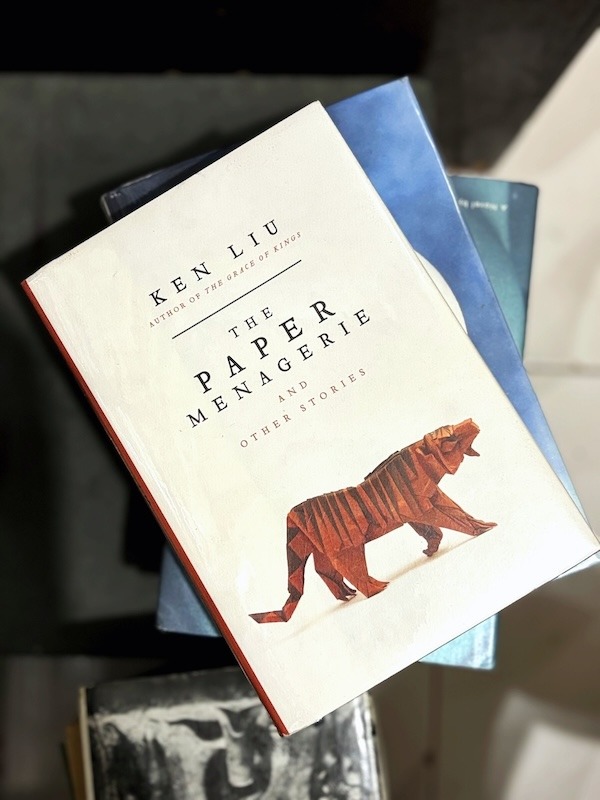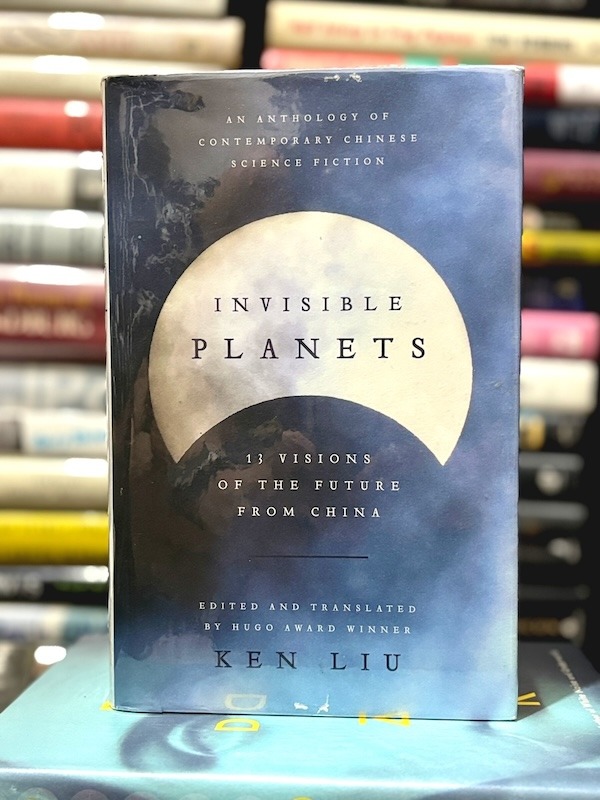As the world becomes more interconnected, it is important to acknowledge and understand the emergence of Chinese science fiction (SF) and its growing influence on a global scale. While the genre has existed in China for decades, it is only recently that Chinese SF has gained international recognition and captivated audiences worldwide.
The emergence of Chinese SF can be attributed to various factors. China’s rapid economic growth and technological advancements have fueled an environment ripe for exploring speculative futures. Additionally, the country’s rich history and cultural heritage provide a distinct backdrop for storytelling within the genre.
Chinese SF authors have prominently featured their individual viewpoints on technology, society, and humanity within their imaginative storylines. In addition to exploring dystopian societies, environmental concerns, artificial intelligence, and virtual reality, their works intricately interweave elements of traditional Chinese culture.
Nevertheless, proceed with caution when exploring Chinese SF. Although it offers intriguing opportunities for interdisciplinary study and genre research, it is important to keep in mind that cultural nuance and subtleties could widely influence how the genre is understood and interpreted.
Furthermore, it is important to exercise open-mindedness with the influence of cultural disparities, political environments, and possible partialities on Chinese SF, despite the distinctive viewpoints and storylines it presents. A comprehensive understanding of science fiction from China necessitates a full appreciation of its nuance and complexities.
In this article, we explore the origins of Chinese SF, discuss notable authors and their contributions to the genre, examine key themes within their works, and analyze how these stories have resonated beyond China’s borders.
The Ongoing Evolution of Chinese SF in the Global Literary Scene
Chinese literature has a rich history, but it is the emergence of science fiction that has captured the attention of readers worldwide. Whether it’s examining the impact of rapid technological advancements or critiquing authoritarian regimes, Chinese SF writers use their narratives as a platform to engage in thought-provoking discussions.
One of the notable aspects of Chinese SF is its ability to offer sociopolitical commentary. Through imaginative storytelling, these works explore pressing issues and shed light on societal challenges in China.
The fusion of ideas from these two distinct literary traditions opens up new horizons for readers worldwide. It allows us to experience imaginative worlds that blend elements of both Eastern and Western cultures seamlessly. Such collaborations serve as a bridge between civilizations, promoting mutual respect and fostering a global community united by a love for science fiction literature.
The Three-Body Problem: From Underground Success to International Acclaim
Central to this transformation are two names: Cixin Liu and Ken Liu. While not related, these two authors have played pivotal roles in introducing Chinese SF to English-speaking readers.
Cixin Liu, best known for his Hugo Award-winning novel The Three-Body Problem (2014) (originally published in Chinese in 2008 as the first book of the trilogy Remembrance of Earth’s Past), has garnered international acclaim and became the first Asian novelist to win the prestigious Hugo Award for Best Novel in 2015.
As part of a trilogy, The Three-Body Problem investigates the consequences of our initial contact with extraterrestrial beings. The story serves as an introduction to the Trisolaran civilization and their eventual invasion of Earth, which is further explored in the succeeding books in the series.
The series raises questions about whether humanity is prepared for the ethical and existential challenges posed by encounters with advanced extraterrestrial technology. Its exploration of first contact, the Fermi Paradox, and the potential for cosmic conflicts resonates with readers worldwide. By exploring complex themes such as physics, philosophy, and humanity’s place in the universe, Cixin Liu masterfully weaves together these elements to create a narrative that transcends borders.
Ken Liu, on the other hand, is an accomplished author in his own right but has been instrumental as a translator, bringing Cixin Liu’s works and other Chinese stories to the English-speaking world. Through his translations of works by Chinese authors, Ken Liu has facilitated cross-cultural exchange and helped showcase the rich literary heritage of Chinese SF.
In addition to translating works of Chinese literature such as The Three-Body Problem, Ken Liu gained recognition for his own short stories. His collection, The Paper Menangerie and Other Stories (2016), provide a distinctive perspective in the genre by fusing Chinese culture with future speculation in a novel way.

However, Chinese SF has a long history that precedes the writings of Cixin Liu and Ken Liu. Classic Chinese stories such as Journey to the West (circa 1592) and Dream of the Red Chamber (1868, 1892; 1973–1980: 1st complete English translation) often incorporate aspects of fantasy and science fiction.
However, it wasn’t until the twentieth century that Chinese SF started to emerge as a separate genre. Writers such as Lu Xun and the revolutionary sci-fi novelist Lao She laid the groundwork for what was to come.
Cixin Liu’s Contribution to the Genre
The success of Cixin Liu and other Chinese authors in the science fiction genre calls into question the concept that this genre is dominated mainly by Western writers. It created new pathways for various voices to be heard and contributed new insights to the ever-evolving field of science fiction literature.
The impact of Cixin Liu on the genre goes well beyond his own accomplishments. It is partly through his visionary storytelling that Chinese SF has gained recognition on an international scale. In addition to improving the genre, his work has paved the way for greater understanding and appreciation of other literary styles, particularly science fiction from China.
Cixin Liu’s writing is characterized by its grand scale and ambitious storytelling, often incorporating elements of Chinese history and culture. His works delve into themes like the survival of humanity, cosmic sociology, and the consequences of technological advancements. These themes resonate universally, yet are deeply rooted in the specificities of Chinese philosophy and thought.
Furthermore, Cixin Liu’s works hold a unique place within Chinese SF literature, as they provide a cultural context that is both enlightening and thought-provoking. He skillfully weaves elements of Chinese history, philosophy, and mythology into his narratives, creating a rich tapestry that adds depth to his storytelling.
Ken Liu’s Role in Reaching English-Speaking Readers
Conversely, Ken Liu’s works often emphasize the human aspect. His work explores the effects of technology on people and communities and is distinguished by a lyrical beauty and a profound empathy for his characters. Not only have his translations helped close the language divide, but they have also enabled a worldwide audience to understand the subtleties of Chinese storytelling and culture.
There are common threads despite the diversity of subjects in Cixin Liu and Ken Liu’s writings. They often examine the ramifications of technological advancements, the nature of humanity, and the nuances of morality and ethics. They combine aspects of Chinese philosophy and history with hard science fiction in their writing to create a distinctive narrative style.
Apart from his original works like The Paper Menagerie, Ken Liu’s translations of The Three-Body Problem by Cixin Liu and also other Chinese authors’ works have been pivotal in introducing Chinese SF to an English-speaking audience, with faithful and nuanced renditions that retain the essence of the original text.
Ken Liu has done more than just improve literature; he has also promoted cross-cultural understanding and appreciation by making Chinese SF more accessible. His mastery of both cultures and his painstaking attention to detail have allowed him to bring Western readers the beauty and soul of Chinese SF.
Technology, Philosophy, and Humanity’s Future in Cixin Liu’s Works
The inquiry into the survival of humanity in an unfathomable and expansive universe comprises the core of Cixin Liu’s literary oeuvre. With philosophical discussions regarding our position in the vast expanse of the cosmos and our duty to preserve our species, his narratives force us to confront moral existential inquiries.

In a world where human existence is a mere speck on the cosmic timeline, his characters frequently confront issues of free will, destiny, and the quest for significance. His narratives are further complicated by this philosophical profundity, which compels readers to reflect on their own place in the universe.
One prominent theme explored in Cixin Liu’s novels is that of technology and its consequences for society. Through his vivid imagination, he presents a future where advancements in technology have far-reaching implications for humanity. By examining the potential outcomes of scientific progress, Liu prompts readers to reflect on the ethical dilemmas and societal transformations that may arise.
In The Three-Body Problem and its sequel, The Dark Forest, Cixin Liu examines the ethical quandaries and strategic considerations that humanity must confront in the face of an imminent alien invasion by utilizing the Wallfacer Project and the Dark Forest as metaphors. What are we willing to forego in order to ensure the continued existence of our species? This is the question posed by these narratives.

In Cixin Liu’s novels, technology is a double-edged sword—it holds the potential to elevate humanity to unprecedented heights, yet it also poses significant risks. In The Three-Body Problem, for example, the concept of the Sophon—a nanoscale particle with incredible computational abilities—demonstrates the fine line between progress and peril. The development of such technology could either lead to humanity’s salvation or its downfall.
The exploration of advanced technology extends beyond the confines of our planet. Cixin Liu’s novels contemplate the consequences of our technological endeavors reaching out into the universe. The construction of the “solar sail” in The Dark Forest and the idea of broadcasting humanity’s existence into space highlight the ethical quandaries surrounding our technological reach.
The concept of the dark forest itself reflects a grim but pragmatic philosophy about the universe. The idea that advanced civilizations remain silent and hidden in the cosmos, fearing the potential predatory nature of other civilizations, underscores a pessimistic view of the universe’s inherent dangers.

The concept of the “dark forest” implies the idea that advanced civilizations remain silent and hidden in the cosmos
The history and culture of China have had a significant influence on Cixin Liu’s novels. How historical events, such as the Cultural Revolution, have influenced China’s approach to science and technology is examined from a singular vantage point. These historical musings regarding China provide a foundation for the examination of intricate moral and ethical dilemmas in a world that is undergoing rapid change.
What Lies Ahead for Chinese SF and its International Influence
The future of this genre and its ongoing effect should be carefully examined in light of Chinese SF’s growing worldwide significance. Because of the success of Cixin Liu and Ken Liu, an increasing number of Chinese authors are becoming recognized on the global stage, and the future looks bright with many exciting opportunities.
Cixin Liu and Ken Liu’s influence goes beyond the success of their writing. They impacted a new generation of authors and readers by promoting a more inclusive and varied study of science fiction subjects. Their success has cleared the path for other non-Western science fiction writers to attain worldwide prominence.
Upcoming Talents in the Chinese SF Writing Scene
The release of Cixin Liu’s The Three-Body Problem and its eventual translation into English by Ken Liu spurred a new generation of Chinese writers to explore science fiction themes, who are committed to pushing the boundaries of the genre and soar the Chinese SF literature to new heights.
While Cixin Liu and Ken Liu have been instrumental in introducing Chinese SF to the world, there is a growing community of indigenous Chinese authors who are making their mark. Writers like Hao Jingfang, Chen Qiufan, and Xia Jia are gaining recognition both in China and internationally.
The following authors are worth highlighting as some of the emerging talents who are poised to make significant contributions to the genre. These writers, often drawing inspiration from their unique backgrounds and experiences, bring fresh perspectives and innovative storytelling of sci-fi to the forefront.

Hao Jingfang
Hao Jingfang gained international recognition when her novella Folding Beijing (2015) won the prestigious Hugo Award for Best Novelette in 2016. Her work combines elements of social commentary with intricate world-building. She explores the consequences of rapid urbanization, social inequality, and environmental degradation in a future Beijing that literally folds and unfolds. Hao Jingfang’s ability to blend cutting-edge speculative concepts with profound human themes makes her a rising star in Chinese SF.
Chen Qiufan
Chen Qiufan, best known for his first book, The Waste Tide (2013), takes readers on a thought-provoking journey through environmental challenges, transhumanism, and the effects of globalization on Chinese culture. His work often explores the interface between technology and mankind, emphasizing issues of identity, ethics, and the implications of scientific progress. Chen Qiufan’s sophisticated storylines have gained him acclaim in China as well as in other parts of the world.
Xia Jia
Xia Jia is a writer and academic whose work reveals a great interest in Chinese culture, history, and classical literature. Her stories flawlessly merge parts of ancient Chinese mythology with future settings. Xia Jia’s contribution to Chinese SF contains themes of cultural identity, the conflict between tradition and modernity, and the changing position of women in Chinese society. Her work has been praised for its lyrical and philosophical qualities, which offer a distinct depth to the genre.
Baoshu
Baoshu is an emerging talent known for his work within the Remembrance of Earth’s Past’s universe, created by Cixin Liu. His novella What Has Passed Shall in Kinder Light Appear (2015) expands upon the world and concepts introduced by Liu, offering a fresh perspective on the series. Baoshu’s ability to craft compelling narratives within an established universe demonstrates his potential to become a prominent figure in the Chinese SF scene.
Regina Kanyu Wang
Regina Kanyu Wang, a bilingual writer who grew up in China and the United States, brings a unique cross-cultural perspective to her science fiction. Her stories often touch on themes of migration, identity, and the impact of technology on human relationships. As an advocate for diverse voices in speculative fiction, Regina Kanyu Wang’s work bridges the gap between East and West and contributes to the global conversation on the genre’s future.
As the impact of Cixin Liu on Chinese SF is examined in greater detail, it becomes evident that his creations have not only engrossed readers around the world but also motivated an emerging cohort of authors to further investigate this literary genre.
A few examples of forthcoming science fiction works from China delve into topics such as the ramifications of the One-Child Policy, the intricate connection between personal and communal identity in Chinese society, and the profound influence of Confucianism and Taoism on forthcoming ethical standards.
Further Reading
How Chinese Sci-Fi Conquered America by Alexandra Alter, The New York Times
A Brief Introduction to Chinese Science Fiction by Regina Kanyu Wang, Mithila Review
What Makes Chinese Science Fiction Chinese? by Xia Jia, Tor.com
Why is Chinese Sci-Fi everywhere lately? Ken Liu knows on Reddit
How a fan fiction for Cixin Liu’s Three-Body Problem became an official novel by Andrew Liptak, The Verge





